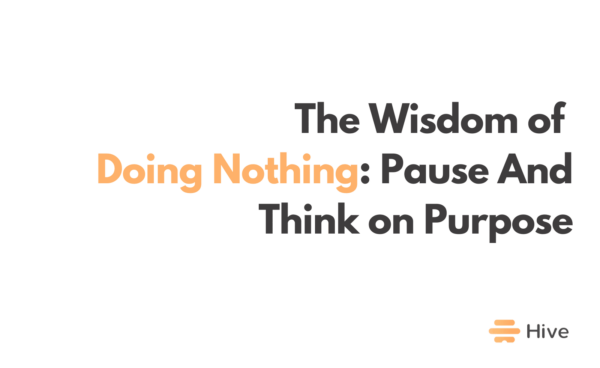In a world where “busy” is the new productive, “nothing time” feels counterintuitive and even a little shameful.
We regard idleness as a kind of failure, an indication that we’ve fallen short of some unspoken standard. But the truth is, idleness is essential to an active life. You might say that it’s the other half of good work.
Doing nothing is the hardest task for anyone who wants to get things done. In its basic form, doing nothing means not acting, just observing, thinking about your thinking, and pondering.
It’s a practice that might seem counterproductive at first. After all, active people are productive people, right? Wrong!
There’s a time and place for action, but there also needs to be a time and place where we stop doing things and give the brain a quality break it needs to restore, recover and make better connections.
That doesn’t make you any less productive — in fact, it makes you extremely productive by unlocking your natural energy and focus so you can get even more done afterwards with ease.
Doing nothing sounds like the kind of advice you hear from your grandparents when they visit — sit still, quiet your mind, and meditate on the meaning of life.
The funny thing is that this same advice applies to your everyday life whether or not your grandparents are around to give it to you.
Doing nothing isn’t as easy as it sounds though because our minds have been trained over many years to move from one thing to another — from task to task — without stopping for even a moment in between tasks.
It takes time to learn how to schedule “nothing” time. But making it a habit has life-changing benefits. And your productivity depends on it.
Doing nothing on purpose is essential to a productive life
Today more than ever, your brain requires you to plan “nothing time” every week.
“To do nothing is sometimes a good remedy,” says Hippocrates.
The pressures from society to achieve and produce are relentless, and the need to validate ourselves by producing things is almost a pandemic.
This has created a culture of doing where people feel they need to be doing something at all times or risk being seen as lazy or unproductive.
In a world where everything feels like it is moving at lightning speed, there is something deeply reassuring and yet challenging about the art of doing nothing.
When we do nothing at all and plan idleness, our bodies and minds respond differently.
Doing nothing forces us to stop and be still. It slows you down so you can find focus and clarity in your life. It makes you more receptive to new ideas rather than coming up with solutions to old problems.
In an age where being busy has become a badge of honor, doing nothing challenges conventional wisdom about needing always to be productive and constantly on the go.
Scheduling “nothing” time can be a great way to relax and unwind after a long day. It also promotes creativity by allowing your mind to wander.
Plus, it can be a great way to reconnect with meaningful social connections.
Every week, make time to pause and ponder! Take a digital sabbath: away from your screen. Step away from work. Hang out with important social connections. Take a nature walk. Go for a long walk. Sit still and think about your thinking.
While the world is constantly moving forward, we need to take a step back and appreciate everything around us. We should plan “nothing time” to relax. It can help us feel refreshed and reenergized, which will be vital as we strive to keep up with the pace of modern life.
This article originally appeared in Medium.





